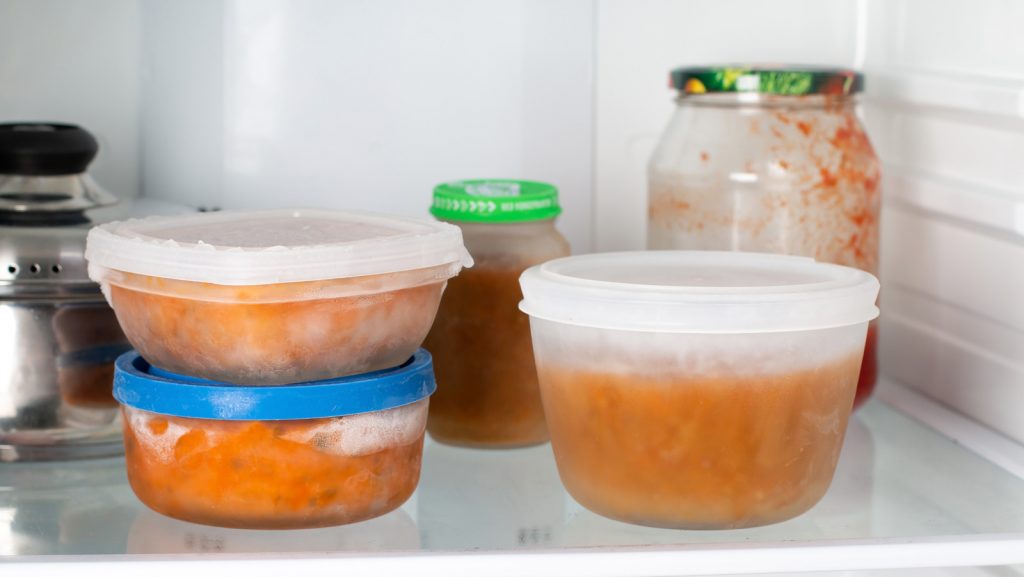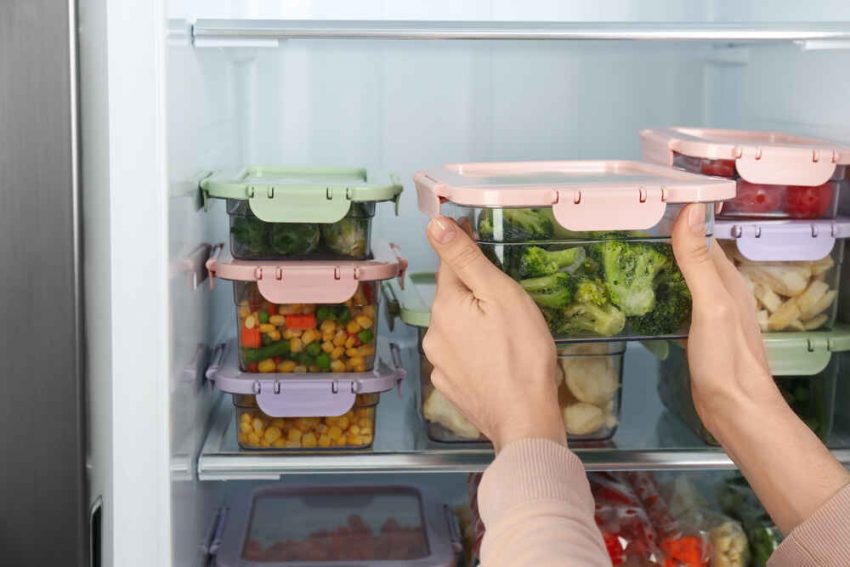When you prepare or buy large quantities of food, you may need to freeze it for long-term storage. Glass containers are always reusable, while plastic bags and foil are sometimes only used once. But can you safely freeze food in glass containers? You can freeze food in glass containers, but you need to take some steps to avoid burning out the refrigerator and breaking glass.
Table of Contents
Can You Freeze Food In A Glass Container
You can freeze solids and liquids in glass jars without any problems. Fresh berries, beans, peas, and the like should be washed, drained, or dried before pouring loosely into jars. Larger items, such as apples, cauliflower, or rhubarb, should be divided first, then layered into jars. It doesn’t make much difference whether the jars are stored upright or in the refrigerator. Now with fluid, this is where it gets interesting. You can also freeze soups, sauces, baby food, applesauce, and other liquid items directly into jars and freeze them. Unlike fruits and vegetables, however, you don’t have air pockets in your jars where Flossen Foods can expand. Therefore, the risk of shattering the glass is higher.
Steps To Freeze Food In Glass Containers

When freezing food, there are three main goals. First, you want your food to taste as fresh as possible after thawing and reheating. Second, you want to prevent the refrigerator from burning out. Finally, prevent the liquid from expanding and causing the glass to break. Here are 7 steps to get started.
1. Set the freezer to the correct temperature
The optimal temperature range for a freezer is 0-5 degrees Fahrenheit. This will freeze food faster. This will help the food stay fresh. When food freezes more slowly, larger ice crystals form, causing the refrigerator to burn.
2. Chill food before freezing
This seems to be the opposite of the first step of freezing as soon as possible. However, putting hot food in the refrigerator can cause more moisture to escape, which is why the refrigerator burns. Hot containers in the refrigerator will also heat other foods in the refrigerator, increasing the likelihood that those foods will be scorched by the refrigerator. When glass experiences rapid temperature changes, it is more likely to crack or break.
3. Use Smaller Containers
Small containers and batches will freeze faster than larger portions in larger containers. The faster your food freezes, the fresher it will taste after you defrost and cook it.
4. Keep the fridge full
The refrigerator is most efficient when it is full. This is because the items in your freezer stay at freezing temperatures and your freezer don’t have to work as hard. You still don’t want to fill up the fridge because that will stop the air from circulating.
5. Use the refrigerator as a safe container
Not all glass containers are safe. When shopping for containers, be sure to choose tempered glass or refrigerator-safe items. This will ensure your food stays fresh and protected, while your glass containers remain intact.
6. Add another layer of protection
Exposure of the food in the container to the air is what causes the refrigerator to burn. You can add another layer of protection by wrapping the food or putting it in a plastic bag before putting it in a glass container. Remove any excess air from the bag or wrap it before placing it in a glass container. Zippered pockets provide extra protection. Check out this article, Are ziplock bags safe for food storage?
7. Leave an inch of space for freezing liquids
Water expands when it freezes. If you’re freezing something with high liquid content, such as soup, it’s critical to leave extra room for this expansion. Tempered glass and freezer-safe containers are also prone to breakage when there is no extra space for the liquid to expand.
Which Containers Are Best For Freezing
Each container material has advantages and disadvantages when it comes to storage and freezing. Plastics may contain BPA, a harmful chemical that can seep into your food. Glass containers can shatter if precautions are not taken when freezing or cooking food. Stainless steel is not suitable for microwave ovens but is very durable.
When choosing the right containers for your kitchen, you should consider how you will use them. If you’re only using containers for storage, you don’t need to worry about oven or freezer safety.
In Closing
Certain types of glass jars and containers are freezer-safe. Be sure to buy items labeled “refrigerator safe” or made of tempered glass. While some of these containers are also oven-safe, you shouldn’t put cold glass dishes in the oven. When freezing foods with high liquid content, it is important to leave extra space at the top of the container to allow the liquid to expand. This will prevent any breakage in the freezer.

